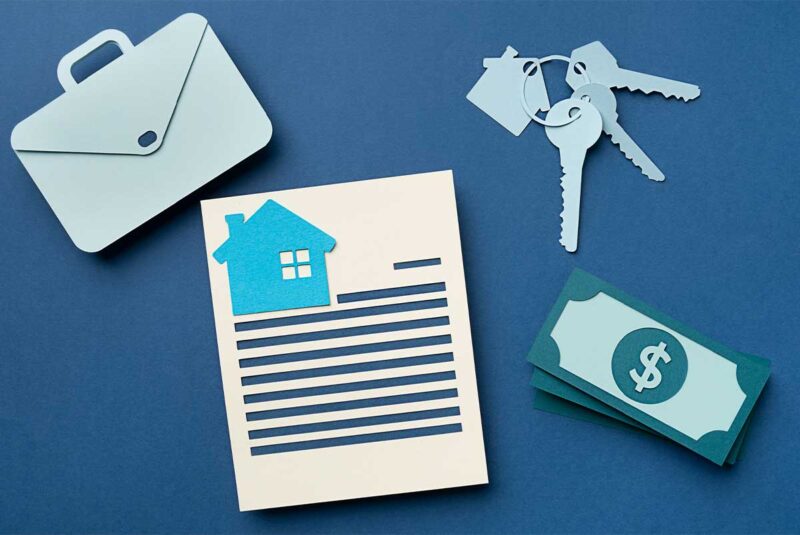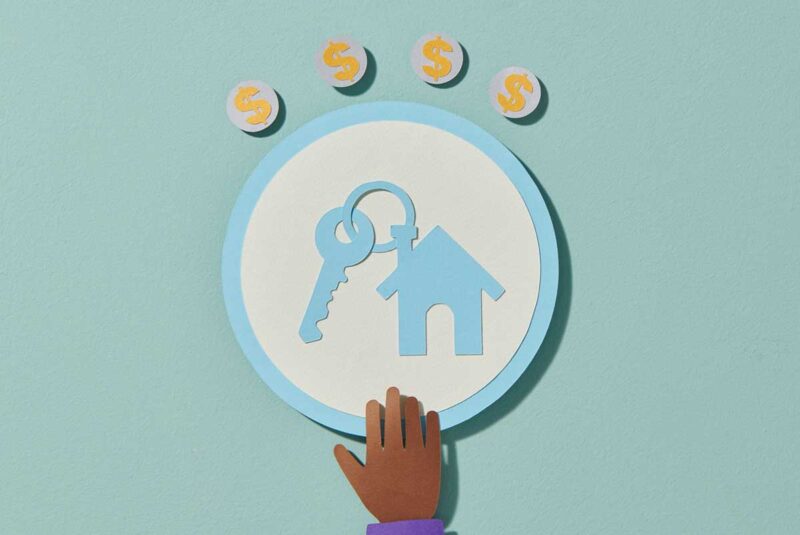Ready To Buy a Home?
Get Approved to Buy a Home
Rocket Mortgage® lets you get to house hunting sooner.
When you started looking for a mortgage, you probably saw different advertised mortgage interest rates and wondered who sets these rates and how they’re calculated. Stab in the dark here, but you probably also wondered what you needed to do to make your mortgage interest rate lower.
When you started looking for a mortgage, you may have noticed that mortgage rates can vary quite a bit from lender to lender. You’ve probably wondered who sets these rates and how mortgage interest is calculated. And, with rates changing consistently, what can you do to make your mortgage interest rate lower?
Well, your mortgage rate is affected every day by market forces you can’t control – like the overall health of the economy – and factors you can control – like the lender you choose, the size and type of loan you take out and your personal finances.
If you’re interested (see what we did there?) in learning more about mortgage interest rates and how these factors will play a role in determining the mortgage interest rate you qualify for, keep reading.
How the Economy Affects Mortgage Rates
Lenders are affected by all kinds of economic factors and market forces that are beyond their control.
The Federal Reserve
The most significant economic factor that affects home loans is the Federal Reserve’s monetary policy. The Fed’s biggest role is to fight inflation (high prices), encourage spending and employment and keep the U.S. economy stable.
The Fed uses a variety of tools – like changes in the federal funds rate, which is the interest rate banks charge each other for overnight loans to set a minimum floor for interest rates. If the Fed raises or lowers the federal funds rate, lenders adjust their interest rates to keep up.
If the economy is struggling due to a recession or high unemployment, the Fed may lower rates to encourage borrowing and keep money flowing into the economy. On the other hand, if prices are rising due to an overheated economy where demand exceeds supply, the Fed may increase rates. Raising interest rates makes things like homes more expensive, which cools demand and eventually helps lower prices.
The bond market
Another critical factor that affects mortgage rates is the bond market. When bond prices go up, interest rates tend to fall, and vice versa.
This is because bonds and mortgage-backed securities (MBS) are two types of investments that compete for the same pool of money – money investors are looking to park in a safe, relatively low-risk investment.
So when bond prices are high, there’s less demand for MBS, and mortgage rates tend to rise. The reverse is also true: when bond prices are low, there’s more demand for MBS, and mortgage rates tend to fall.
Unemployment rate
When people are working, they have more money to spend and interest rates tend to go up. When unemployment is high, interest rates tend to go down to encourage more spending.
Inflation rate
Inflation measures how much stuff a dollar can buy. When inflation is high and prices go up, interest rates tend to go up as well. The theory is that, by reducing the money supply, goods and services become less affordable. When goods and services are less affordable, fewer people want to buy them. That reduces demand and stabilizes rising prices.
Local and national housing markets
When interest rates are low, people are more likely to buy a house. This can lead to higher demand, which would make the housing market more competitive.
How Mortgage Type Affects Mortgage Rates
Here’s something you do have control over: the type of mortgage you pick. Assuming that the economy is on your side, the type of mortgage you apply for will affect the mortgage rate you’re offered.
Conventional or government-backed mortgage
The majority of mortgage loans in the U.S. are conventional mortgage loans.[1] That means that the lenders set loan terms at their discretion.
If you’re interested in a government-backed mortgage, the lender has the final say in setting the interest rate, but the U.S. government has a say, too.
- Federal Housing Administration (FHA) loans: Anyone can apply for an FHA loan. The loans are targeted to home buyers with lower credit scores (we’ll touch on that soon) and past debt and credit issues. If you get an FHA loan, you should probably expect to pay a higher interest rate.
- Department of Veterans Affairs (VA) and U.S. Department of Agriculture (USDA) loans: If you qualify for a VA loan (reserved for veterans, active duty service members and qualified surviving spouses) or a USDA loan (aimed at home buyers interested in buying or building a home in a rural community), you may get a lower interest rate than you would with a conventional loan.
Fixed-rate or adjustable-rate mortgage
The interest rate on a fixed-rate mortgage is locked in for the life of the loan. Adjustable-rate mortgages start with a lower interest rate introductory period usually ranging between 3 – 10 years.
The lower introductory rate is tempting, but it can adjust up or down based on the current interest rate. These adjustments typically happen every 6 months or a year. Depending on the interest rate caps set by your loan terms, your interest rate could rise significantly above the introductory rate.
15-Year vs. 30-Year mortgage rates
Lenders usually charge a lower interest rate for a 15-year mortgage than a 30-year mortgage. Why? With a shorter mortgage, the lender knows the loan will be repaid sooner.
Yes, you’ll have a higher monthly mortgage payment with a 15-year mortgage. But you’ll pay off your mortgage faster and pay less in interest than you would with a 30-year mortgage.
Primary residence, vacation home or investment property
Lenders tend to offer lower interest rates for primary residence mortgages than they do for mortgages on second homes or investment properties. Why? Because they know that if things go wrong, a borrower will likely prioritize the mortgage payments on their home over their investment property.
How Personal Factors Affect Your Mortgage Rate
Lenders determine the interest rate they’ll charge you based on how much competition there is for your business and your creditworthiness (think: reliability to pay back a loan). The good news is that there are ways to control how these factors will affect your mortgage rate.
Credit score
Your credit score is a number that ranges from 300 – 850 and is a measure of your creditworthiness. Most conventional loans require a credit score of 620 or higher to qualify for a mortgage.[2] The higher your score, the less a lender is likely to charge you in interest.
Creating a budget and paying down debt, especially high-interest credit card debt, is a great way to boost your credit score.
Debt-to-income (DTI) ratio
Your debt-to-income (DTI) ratio measures your fixed monthly expenses – such as rent, mortgage, minimum credit card payments, student loans, auto loans and personal loans – against your gross monthly income.
While you can qualify for a mortgage with a DTI ratio of up to 45%, most lenders prefer 36% or lower.[3] The lower your DTI ratio, the better the interest rate your lender can offer.
Paying off debt or consolidating high-interest debt to lower your monthly payment can help improve your DTI ratio.
Loan-to-value (LTV) ratio
Your loan-to-value (LTV) ratio is the amount you owe on your mortgage divided by the appraised value of your home. Lenders may also set a limit on how much of your home’s LTV you can borrow against.
For example, if you owe $200,000 and the home is appraised at $250,000, your LTV ratio is 80%. You can technically borrow up to $50,000 more. However, most lenders will not allow you to borrow more than 80% of your home’s value. So you likely won’t get a loan for that amount.
Down payment
The good news is it’s possible to qualify for a mortgage loan with a down payment as low as 3%.[4] However, the lower your down payment, the more you’ll likely be charged in interest.
If you need help saving for a down payment, consider asking friends and family for help or researching down payment assistance programs in your area.
Approximate Your Mortgage Interest Rate Today
Your mortgage rate will never be entirely in your control, but understanding how your interest rate is calculated can give you the power to control some aspects of your interest rate.
Want to figure out what your mortgage interest rate will be before you talk to a lender? Many lenders post current mortgage interest rates for different loan types every day. Just remember, the advertised rate will adjust up or down depending on your credit score, DTI and down payment.
You can also use a mortgage calculator to test-drive different interest rates and see how an interest rate will affect your ability to afford a home.
Get approved to buy a home.
Rocket Mortgage® lets you get to house hunting sooner.
The Short Version
- Your mortgage rate is affected every day by market forces you can’t control, like the overall health of the economy
- Lenders determine the interest rate they’ll charge you based on your creditworthiness and how much competition there is for your business
- Creating a budget and paying down debt, especially high-interest credit card debt, is a great way to boost your credit score
Federal Housing Finance Agency. “NATIONAL MORTGAGE DATABASE (NMDB) AGGREGATE DATA.” Retrieved January 2022 from https://www.fhfa.gov/DataTools/Downloads/Pages/National-Mortgage-Database-Aggregate-Data.aspx
Fannie Mae. “B3-5.1-01, GENERAL REQUIREMENTS FOR CREDIT SCORES.” Retrieved August 2022 from https://selling-guide.fanniemae.com/Selling-Guide/Origination-thru-Closing/Subpart-B3-Underwriting-Borrowers/Chapter-B3-5-Credit-Assessment/Section-B3-5-1-Credit-Scores/1032996841/B3-5-1-01-General-Requirements-for-Credit-Scores-08-05-2020.htm
Fannie Mae. “B3-6-02, DEBT-TO-INCOME RATIOS.” Retrieved August 2022 from https://selling-guide.fanniemae.com/Selling-Guide/Origination-thru-Closing/Subpart-B3-Underwriting-Borrowers/Chapter-B3-6-Liability-Assessment/1032992131/B3-6-02-Debt-to-Income-Ratios-02-05-2020.htm#DTI.20Ratios
Fannie Mae. “ELIGIBILITY MATRIX.” Retrieved August 2022 from https://singlefamily.fanniemae.com/media/20786/display




